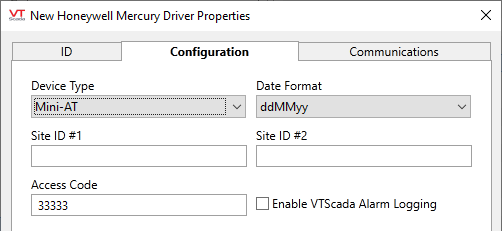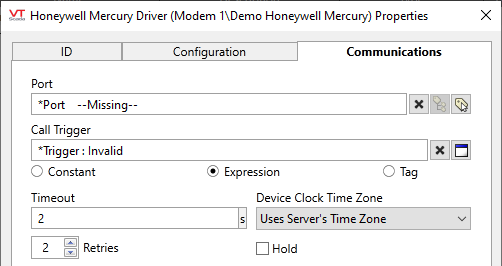Honeywell Mercury Driver
Not counted towards your tag license limit.
This driver can communicate with the following versions of Honeywell Mercury flow computer devices:
- ECAT
- Mini-AT (firmware versions newer than 6.81)
- Mini-Max (firmware versions newer than 2.60)
- ERX
- EC350
- ERX350
The following Honeywell Mercury protocol features are supported:
- Reading item data.
- Reading of live data items.
- Write data to an item.
- Retrieving logged data records (including extracting events from audit trigger/alarm field).
- Reading of event log records (when supported by device).
- Reading of alarm log records (when supported by device).
- Support for incoming calls initiated by a site.
Unlike a standard driver, all reads and writes are done together after establishing a session with the RTU. Standard read triggers in IO tags are disabled. If a write is called, the value to be written is saved within the driver and then written out during the next calling session.
What is read by the driver during each call is determined by the addresses configured in I/O tags using this driver.
Related application properties
The following property settings hold additional configuration parameters for your Honeywell Mercury driver:
MercuryDriverAlarmXXXPriority, where XXX is the item number (only a certain subset of item numbers are alarms).
MercuryDriverEventXPriority, where X is the event code, ranging between 0 and 22.
MercuryDriverTAPriority_XXXX, where XXXX is a particular Trigger Type.
The ID tab of every tag includes the same common elements: Name, Area, Description, and Help ID.
Name:
Uniquely identifies each tag in the application. If the tag is a child of another, the parent names will be displayed in a separate area before the name field.
You may right-click on the tag's name to add or remove a conditional start expression.
Area
The area field is used to group similar tags together. By defining an area, you make it possible to:
- Filter for particular tag groups when searching in the tag browser
- Link dial-out alarm rosters to Alarm tags having a particular area
- Limit the number of tags loaded upon startup.
- Filter the alarm display to show only certain areas.
- Filter tag selection by area when building reports
When working with Parent-Child tag structures, the area property of all child tags will automatically match the configured area of a parent. Naturally, you can change any tag's area as required. In the case of a child tag, the field background will turn yellow to indicate that you have applied an override. (Orange in the case of user-defined types. Refer to Configuration Field Colors)
To use the area field effectively, you might consider setting the same Area for each I/O driver and its related I/O tags to group all the tags representing the equipment processes installed at each I/O device. You might also consider naming the Area property for the physical location of the tag (i.e. a station or name of a landmark near the location of the I/O device). For serial port or Roster tags, you might configure the Area property according to the purpose of each tag, such as System or Communications.
You may define as many areas as you wish and you may leave the area blank for some tags (note that for Modem tags that are to be used with the Alarm Notification System, it is actually required that the area field be left blank).
To define a new area, type the name in the field. It will immediately be added. To use an existing area, use the drop-down list feature. Re-typing an existing area name is not recommended since a typo or misspelling will result in a second area being created.
There is no tool to remove an area name from VTScada since such a tool is unnecessary. An area definition will exist as long as any tag uses it and will stop existing when no tag uses it (following the next re-start).
Description
Tag names tend to be brief. The description field provides a way to give each tag a human-friendly note describing its purpose. While not mandatory, the description is highly recommended.
Tag descriptions are displayed in the tag browser, in the list of tags to be selected for a report and also on-screen when the operator holds the pointer over the tag’s widget. For installations that use the Alarm Notification System, the description will be spoken when identifying the tag that caused the alarm.
The description field will store up to 65,500 characters, but this will exceed the practical limits of what can be displayed on-screen.
This note is relevant only to those with a multilingual user interface:
When editing any textual parameter (description, area, engineering units...) always work in the phrase editor. Any changes made directly to the textual parameter will result in a new phrase being created rather than the existing phrase being changed.
In a unilingual application this makes no difference, but in a multilingual application it is regarded as poor practice.
Help Search Key
Used only by those who have created their own CHM-format context sensitive help files to accompany their application.
Server List
Select (or create) a named server list.
Honeywell Mercury Driver, Configuration properties tab

Device Type
Commands work differently based on the device. Select from any of:
- Mini-AT
- Mini-Max
- ECAT
- EC 350
- ERX
- ERX 350
Date Format
Three options are allowed:
- MMDDYY
- DDMMYY
- YYMMDD
Site ID #1, Site ID #2
Used by the discriminator to determine the driver to which inbound calls are sent.
Access Code
Defaults to 33333
Enable VTScada Alarm Logging
Select if alarms read from the device should be recorded in the VTScada alarm history.
Honeywell Mercury Driver, Communications properties tab

Port
Must be a serial port, to which a modem or cellular modem is attached.
Call Trigger
A tag or expression. A call is placed when this value changes from zero to any non-zero value.
Timeout
Specify the time in seconds, after which a call is aborted if there is no response. Defaults to 2 seconds.
Device Clock Time Zone
VTScada stores all values using UTC time zone. To store time-stamped data correctly, you must specify the timezone of the RTU.
Retries
The number of times to retry a message before declaring an error.
Use only if the driver is connected to a device that uses a serial port or a UDP/IP port that is configured to be polled. When connected directly to a device using TCP/IP, this value should normally be set to 0 since TCP/IP is a guaranteed message delivery protocol.
For unreliable communications, such as radio, set to 3 or 4.
Hold
Select this to have I/O tags attached to the driver hold their last value in the event of a communication failure. If not selected, tags will have their value set to invalid on a communication failure.
The following widgets are available to display information about your tags:
